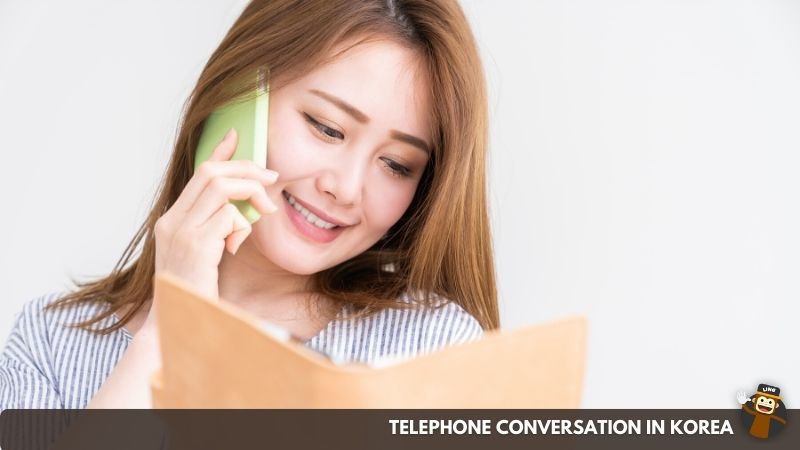Got a call? Impress your friends by saying 여보세요 or yeoboseyo in Korean. The world without phones is unimaginable. So, let’s learn about these valuable phrases for telephone conversation in Korean.
Phone calls are a global need. Calls are one of the best forms to get a personal response. Calls also bring people closer, even if they are in different places. Fortunately, the lines of communication have also improved a lot throughout the years because of varying call services. Now, most people in the world own cell phones or telephones, and calling is considered one of the first things a person can learn effortlessly.

But, even though it’s easy to learn how to call and start a conversation, it’s different when we talk about phone conversations using a foreign language. You have to learn not just the words but also many things like etiquette and polite words to use. When you successfully know how to have a phone conversation using a new language, it will enable you to communicate with other people from different countries, be it for professional or personal purposes. It will also provide more career opportunities like a virtual assistant, international customer service, and more.
So, today, we will learn about phrases for telephone conversation in Korean used in different situations. Every Korean word or phrase that you will learn will have romanization and English translation to make it easier.
Essential Korean Phrases For Telephone Conversation
Phone calls have always been important, from simply talking to friends and loved ones to business and work-related purposes. The K-dramas and movies like Goblin, The King: Eternal Monarch, and The Call, have a lot of unforgettable scenes that involve phone calls. Even in the K-drama Reply 1988, when landlines and telephone booths were used, you can see how phone calls are essential in their daily lives.

Phone calls have dramatically improved since the old times. In Reply 1988, you can see that they still use the traditional telephone and phone booths. But now, South Koreans have developed a lot of high-end cellphones, and they never fail to feature that in their K-dramas and movies. They also have the KakaoTalk, a messaging app that connects individuals worldwide.
Many Korean learners fear speaking because they’ll use formal language in informal settings or vice versa- they won’t know when to use formal or informal language. Using only informal language with strangers or older people could create a wrong impression of you. Using honorifics is highly observed in South Korea, not just for phone calls. Honorifics can help prevent misunderstandings. Remember who you’re calling.
Now, we will learn some useful Korean phrases related to a telephone conversation.
Answering The Phone

여보세요? (Yeoboseyo?)
English Translation: Hello?
The word 여보세요? (Yeoboseyo?) is the simplest and easiest way to begin a phone conversation. There are no “nice” or “casual” ways to answer the phone in Korean; they always use this predefined sentence unless we’re on the phone for business.
“Hello” can be used for both personal and phone conversations in English. It’s the same as 안녕하세요 (Annyeonghaseyo) or Hello in Korean.
안녕하세요 (Annyeonghaseyo)
English Translation: Hello!
The Korean word, 안녕하세요. (Annyeonghaseyo) is the standard way to say Hello in Korean. Just like in English, Hello (안녕하세요. Annyeonghaseyo) can be used for both personal and phone conversations. But, 여보세요? (Yeoboseyo?) is only used for phone calls. You can’t use it in an in-person conversation.
네 (Ne)
English Translation: Yes?
Another way of answering a phone call is the elongated sound 네 (ne), but elders commonly use this. It’s like when Dal-mi’s grandmother answers the call of Ji-pyeong.
무엇을 도와드릴까요? (Mueoseul dowadeurilkkayo?)
English Translation: How may I help you?
Customer service employees or secretaries frequently use this phrase. It is used to begin a conversation with a caller. Before saying this sentence, they usually state the company’s name, followed by their own. Secretary Kim might say this if she takes a call from Lee Young-Joon’s business partners.
뭐 해? (Mwo hae?)
English Translation: What are you up to?
For a nice friendly, or casual conversation, you can use 뭐 해? (Mwo hae?). You’re close enough, like Sa Hye-Jun and An Jeong-Ha in Record of Youth.
Identifying Yourself
![Identifying Yourself 안녕하세요, [이름]입니다. (Annyeonghaseyo, [ireum]imnida.) -Telephone-Telephone-Conversation-In-Korean-Ling](https://ling-app.com/wp-content/uploads/2022/06/6.jpg)
안녕하세요, [이름]입니다. (Annyeonghaseyo, [ireum]imnida.)
English Translation: Hello, this is [name]
Identifying yourself is important, especially in formal situations. The first simplest way to identify yourself is 안녕하세요, [이름]입니다. (Annyeonghaseyo, [ireum]imnida.). You can also say, 네, 안녕하세요, [이름] 입니다. (Ne, annyeonghaseyo, [ireum]imnida.) which also works the same. Just choose what’s comfortable for you.
[회사이름] 의 [이름]입니다. ([Hoesaileum] ui [ireum]imnida.)
English Translation: This is [name] of the [company’s name]
This is a formal way to introduce yourself over the phone and is widely used in business. You’ll usually hear this in customer service o receptionists of companies. Although 여보세요 (yeoboseyo) is the standard phone greeting in Korea, it should not be used in business or other formal situations because it sounds unprofessional.
나야 (Naya)
English Translation: It’s me.
This phrase is used if the person on the other end of the line is someone close to you or already familiar with your voice. It is the phrase that Bo-ra and Sun-woo can use with each other.
Saying The Reason For Calling

문의 드릴것이 있어서 전화드렸어요. (Munui deurilgeosi isseoseo jeonhwadeuryeosseoyo.)
English Translation: I am calling because I have an inquiry
After identifying yourself, you’ll have to say your intention or reason for calling. The phrase 문의 드릴것이 있어서 전화드렸어요. (Munui deurilgeosi isseoseo jeonhwadeuryeosseoyo) can be used in inquiring about products and services. You can use it to ask about your parcel delivery, billing concerns, and more.
예약하려고 전화드렸어요. (Yeyaghalyeogo jeonhwadeuryeosseoyo.)
English Translation: I am calling to make a reservation.
Do you want to make a dinner reservation in a nice restaurant like where Shin Ha-ri and Kang Tae-Moo had their first date? You can use the phrase, 예약하려고 전화드렸어요. (Yeyaghalyeogo jeonhwadeuryeosseoyo).
안 본지 너무 오래돼서 잘 지내는지 궁금해서 전화해봤어. (An bonji neomu oraedwaeseo jal jinaeneunji gunggeumhaeseo jeonhwahaebwasseo.)
English Translation: It’s been a while since we saw each other, so I called to check up on you.
Phone calls are meant to connect with people, especially if they can’t see each other in person. To check up on someone, you can use 안 본지 너무 오래돼서 잘 지내는지 궁금해서 전화해봤어. (An bonji neomu oraedwaeseo jal jinaeneunji gunggeumhaeseo jeonhwahaebwasseo.). This is the phrase that Ko Yu-rim can use with Na Hee-do when she moved to Russia.
뭐하고 있는지 궁금해서 전화해봤어. (Mwohago inneunji gunggeumhaeseo jeonhwahaebwasseo.)
English Translation: I called because I am curious about what you are doing now.
For a more personal and casual conversation, you can say, 뭐하고 있는지 궁금해서 전화해봤어. (Mwohago inneunji gunggeumhaeseo jeonhwahaebwasseo). You’ll often hear this with couples or lovers that are not with each other, like Na Hee-do and Baek Yi-jin. This isn’t a phrase that you can use in a formal situation.
Requesting To Talk To A Person

___씨와 통화할 수 있을까요? (___ssiwa tonghwahal su isseulkkayo?)
English Translation: Could I speak to ___, please?
There are times that your call won’t be picked up by the person whom you are trying to call. You can use the phrase ___씨와 통화할 수 있을까요? (___ssiwa tonghwahal su isseulkkayo?) to ask for the person you’re reaching.
When asking to talk with someone in a business situation, it’s polite to use either 씨 (ssi) or 님 (nim). Both imply “Mr.” / Mrs. / Ms.” However, 님 (nim) is more polite than (ssi). If you don’t know a term, ask a coworker. Which method? Follow them.
[Family name] [Job title]님 + 자리에 계신가요? ([Family name] [Job title]nim + jarie gyesingayo?)
English Translation: Is Mr./Ms. [Name] there?
If you’re specifically looking for someone in a business or formal setting, you can simply say, [Family name] [Job title]님 + 자리에 계신가요? ([Family name] [Job title]nim + jarie gyesingayo?). You can also use this to speak for a professional like teachers, principals, etc.
[이름] 바꿔줄래? ([Ireum] bakkwojullae?)
English Translation: Can you put me through to [name?]
This is a casual way to say, “Can you put me through to [name?]”. But, if you want to make it polite, you can use 이름] 바꿔주시겠습니까? (Iireum] bakkwojusigetseumnikka?)
[이름] 집에 있습니까? ([Ileum] jibe issseumnikka?)
English Translation: Is [name] home.
If you’re trying to reach a friend and someone else answers, use the sentence [이름] 집에 있습니까? ([Ileum] jibe issseumnikka?). But, if you want to say it casually, use: [이름] 지금 집에 있어? ([Ireum] jigeum jibe isseo?)
Requesting Clarification

좀 더 크게 말씀해 주시겠어요? (Jom deo keuge malsseumhae jusigesseoyo?)
English Translation: Could you speak up a bit more, please?
There are communication barriers that you might encounter that can result in misunderstanding. It can be a technical barrier or a language barrier. The best way to address this is to request clarification. One of the ways to avoid miscommunication is by asking the person to speak louder. To do that, you can say, 좀 더 크게 말씀해 주시겠어요? (Jom deo keuge malsseumhae jusigesseoyo?).
다시 말씀해 주시겠어요? (Dasi malsseumhae jusigesseoyo?)
English Translation: Could you repeat that please?
Another way of clarifying details is to ask for repetition. This is usually done in phone conversations, like ordering food or giving account and contact numbers.
In casual conversations, you can use 다시 한번 말해줄래? (dasi hanbeon malhaejullae?) which means, “Can you say it again?””
잘 안들리는데 다시 말씀해 주시겠어요? (Jal andeullineunde dasi malsseumhae jusigesseoyo?)
English Translation: I’m having a hard time hearing you. Can you say that again, please?
This is another variant of asking to repeat the message, but this one is a lot more polite. For a shorter version, you can say, 다시 말씀해 주시겠어요? (dasi malsseumhae jusigesseoyo?) which means, “Could you repeat that, please?”.
전화 상태가 너무 안좋은데요. (Jeonhwa sangtaega neomu anjoeundeyo.)
English Translation: The connection is not good.
The connections can sometimes be interrupted, like the lack of signal of cellphones. If you’re having a hard time hearing the person on the other line, you can say, 전화 상태가 너무 안좋은데요. (Jeonhwa sangtaega neomu anjoeundeyo). Sometimes, this is also used when you want to avoid talking with someone. You tend to pretend that your signal is weak.
You can also use the 잘 안들려. (Jal andeullyeo.) which means “I can’t hear you,” but only for casual conversations.
뭐라고? (Mworago?)
English Translation: What?
This is the easiest way to ask for clarification but never use it when talking to elders or people with higher ranks. Take note that this is only used in informal situations.
Putting Someone On Hold

잠시만 기다려주세요. (Jamsiman gidaryeojuseyo.)
English Translation: Hold on, please.
There are times that you’ll need to put someone on hold or the other way around. In the Korean language, you can say, 잠시만 기다려주세요. (Jamsiman gidaryeojuseyo.). If you want to say it casually, use:잠시만요. (Jamsimanyo.) which means “Wait a minute.”
[이름] 씨 연결해 드리겠습니다. ([Ileum] ssi yeongyeolhae deurigetseumnida.)
English Translation: I’ll put you through to (name).
The opposite party may say this phrase if you ask to be transferred. But, you can also hear 연결해 드리겠습니다. (Yeongyeolhae deurigetseumnida). This one doesn’t have a name on it.
통화중입니다. (Tonghwajungimnida.)
English Translation: He/she is on the phone right now.
You’ll be sometimes put on hold because the person you want to reach is talking to another person. You might be put on hold, or you might be asked to call again later. To do that, you can say, 통화중입니다. (Tonghwajungimnida).
잠깐만. (Jamkkanman.) / 잠만. (Jamman.)
English Translation: Hold on.
I’m pretty sure that you have heard this multiple times in K-dramas. If you want an easy way to put somebody on hold, use any of these two. But, this is only used among friends.
Leaving A Message

메시지를 남기시겠어요? (Mesijireul namgisigesseoyo?)
English Translation: Would you like to leave a message?
There will be situations where you will not be able to talk with the person you want to reach. If you have a really important thing to say, you might as well leave a message. If this happens to you, the person on the other end of the line might ask you if you want to leave a message. In Korean, the phrase 메시지를 남기시겠어요? (Mesijireul namgisigesseoyo?) is a common way to say it. You can also use it if you’re on the other end of the line.
메시지 남겨주시겠습니까? (Mesijireul namgyeojusigetseumnikka?)
English Translation: Could you leave a message?
If you have an important message to rely on, but you were not able to talk with the person you’re trying to call, you can ask 메시지 남겨주시겠습니까? (Mesijireul namgyeojusigetseumnikka?).
전화했었다고 전해주실래요? (Jeonhwahaesseotdago jeonhaejusillaeyo?)
English Translation: Could you please tell him/her that I called?
There are situations where leaving a message won’t be enough to say what you want to say. In that situation, you can ask to inform the person you’re trying to connect with that you call. This is mainly used if you have urgent concerns with the person. To do that, you can say 전화했었다고 전해주실래요? (Jeonhwahaesseotdago jeonhaejusillaeyo?).
메시지 남겨주시겠습니까? (Mesijireul namgyeojusigetseumnikka?)
English Translation: Could you leave a message?
If you have an important message to rely on, but you were not able to talk with the person you’re trying to call, you can ask 메시지 남겨주시겠습니까? (Mesijireul namgyeojusigetseumnikka?).
More Korean Phrases For Phone Conversation
Korean Words And Phrases Related To Phone Calls
Basic Telephone Conversation In Korean
Friendly Conversation
Person 1: 여보세요. (Yeoboseyo.) – “Hello.”
Person 2: 어, 안본지 오래됐는데 같이 점심이라도 먹을까? Eo, Anbonji oraedwaetneunde gachi jeomsimirado meogeulkka?) – Hey! It’s been a while since we’ve met. Do you want to have lunch with me?”
Person 1: 응 좋아. 어디로 갈까? (Eung joa. Eodiro galkka?) – “Yes, sounds good. Where should we go?”
Person 2: 괜찮은곳 알아. 이번 주 금요일 한 시 어때? (Gwaenchaneungot ara. IIbeon ju geumyoil han si eottae?) – “I know a good place. How about Friday at one o’clock?”
Person 1: 응 좋아. (Eung joa.) – “Yeah, sounds good.”
Person 2: 그때 봐. (Geuttae bwa.) – “See you then.”
Restaurant Reservation
Person 1: 송도원입니다. (songdowonimnida) – This is SongDoWon.
Person 2:
여보세요, 점심 예약하려고 전화드렸어요. (Yeoboseyo, jeomsim yeyakaryeogo jeonhwadeuryeosseoyo.) – “Hello, I am calling to make a reservation for lunch.”
Person 1:
네, 언제로 잡아드릴까요? (Ne, eonjero jabadeurilkkayo?) – Okay. When would you like to come?
Person 2: 이번 주 –목요일 한 시요. (Ibeon ju mogyoil han siyo.) This Thursday at one p.m., please.
Person 1: 몇 분이세요? (Myeot buniseyo?) – How many people?
Person 2: 두 명입니다. (Du myeongimnida.) – Two people.
Person 1: 성함은 어떻게 되세요? (Seonghameun eotteoke doeseyo?) – Can I have your name, please?
Person 2: 김태리 입니다 gimtaeri imnida – It’s Kim Tae-ri.
Person 1: 네 알겠습니다. 이번주 목요일 한 시 입니다 씨 이름으로 테이블 예약해드리겠습니다.
(Ne algetseumnida. Ibeonju mogyoil han si gimtaeri ssi ireumeuro teibeul yeyakaedeurigetseumnida.)
Okay. I reserved a table for this Thursday at one p.m. under the name of Kim Tae-ri.
Person 2: 네 알겠습니다. 감사합니다. (Ne algetseumnida. Gamsahamnida.) – Okay. Thank you.
Person 1: 그때 봐. (Geuttae bwa.) – See you then.
Calling For Query
Caller: 여보세요 (yeoboseyo) – Hello?
Agent: 안녕하세요, [이름]입니다. 무엇을 도와드릴까요? (Annyeonghaseyo, dong-hyun.imnida.) – Hello, this is Dong-Hyun. How may I help you?
Caller: 안녕하세요, 문의드릴것이 있어서 전화드렸어요. – (Munui deurilgeosi isseoseo jeonhwadeuryeosseoyo.) I am calling because I have an inquiry.
Agent: 도움을 드리고 싶은데요. 계좌번호 좀 알려주시겠어요? (doumeul deurigo sipeundeyo gyejwabonho jom alryojusigessoyo I’d be happy to help you.) – Can I have your account number?
Caller: 죄송하지만 저는 그것을 가지고 있지 않습니다. (jwesonghajiman joneun geugoseul gajigo itjji ansseumnida) – I’m afraid I don’t have that with me.
Agent: 문제 없어요. 우리 데이터베이스에서 당신 이름만 찾아볼게요. (munje opssoyo uri deitobeiseueso dangsin ireumman chajabolkkeyo) – It’s no problem. I’ll just look your name up in our database.
Caller: 엄청나. omchongna – Great.
Agent: 이름을 알려 주실 수 있습니까? (ireumeul alryo jusil su itsseumnikka) – Could you give me your name?
Caller: 윤채원이에요. (yunchaewonieyo) – It’s Yoon Chae-Won.
Agent: 주소도 좀 알려주시겠어요? (jusodo jom alryojusigessoyo) – Could you give me your address as well?
Caller: 물론이죠! 314-4, Goejeong 2(i)-dong Saha-gu, Busan. (mulronijyo, 314-4, Goejeong 2(i)-dong Saha-gu, Busan.) – Sure! 314-4, Goejeong 2(i)-dong Saha-gu, Busan.
Agent: 좋아, 내 컴퓨터에 네 계정이 있어. 무엇을 도와드릴까요? (joa nae kompyutoe ne gyejongi isso muoseul dowadeurilkkayo) – Ok, I have your account up on my computer. How may I help you?
Caller: 내가 마지막으로 받은 청구서는 너무 높은 것 같았다. (naega majimageuro badeun chonggusoneun nomu nopeun got gatattta) – The last bill I received seemed too high.
Agent: 네, 작년보다 상당히 높았던 것 같습니다. 전기를 더 썼나요? (ne jangnyonboda sangdanghi nopattton got gatsseumnida jongireul do ssonnayo) – Yes, I see that it was considerably higher than last year. Did you use more electricity?
Caller: 아니요, 작년보다 전기를 더 많이 쓴 것 같지는 않아요. (aniyo jangnyonboda jongireul do mani sseun got gatjjineun anayo) – No, I don’t think we used any more electricity than the year before.
Agent: 좋아, 내가 뭘 할 수 있는지 말해줄게. 여기에 표시해서 상사에게 계좌를 보라고 할게요. (joa naega mwol hal su inneunji malhaejulge yogie pyosihaeso sangsaege gyejwareul borago halkkeyo) – OK, I’ll tell you what I can do. I’ll mark this and have a supervisor take a look at the account.
Caller: 감사합니다. 언제쯤 답변을 받을 수 있을까요? (gamsahamnida onjejjeum dapppyoneul badeul su isseulkkayo) – Thank you. When can I expect an answer?
Agent: 주말까지는 답변을 드릴 수 있을 겁니다. 문의 번호를 알려드리겠습니다. (jumalkkajineun dapppyoneul deuril su isseul gomnida muni bonhoreul alryodeurigetsseumnida) – We should have an answer for you by the end of the week. I’ll give you an inquiry number.
Caller: 알았어요, 준비됐어요. (arassoyo junbidwaessoyo) – OK, I’m ready.
Agent: 그건…89-9-085-7389 (geugon 89-9-085-7389) – It’s 89-9-085-7389
Caller: 네. 도와주셔서 감사합니다. (ne dowajusyoso gamsahamnida) – Okay. Thank you for your help.
Agent: 제가 좋아서 한 거예요. (jega joaso han goeyo) – It was my pleasure.
Food Delivery
Restaurant: BHC치킨님, 무엇을 도와드릴까요? bieichissi chikinnim muoseul dowadeurilkkayo – BHC Chicken, how can I help you?
Caller: 안녕하세요. 주문하고 싶은데요. (annyonghaseyo jumunhago sipeundeyo) – Hello. I’d like to make an order.
Restaurant: 알겠습니다. 픽업이나 배달은요? (algetsseumnida pigobina baedareunnyo) – Okay. For pick-up or delivery?
Caller: 배달해 주세요. (baedalhae juseyo) – Delivery, please.
Restaurant: 당신의 주소를 알 수 있을까요? (dangsine jusoreul al su isseulkkayo) – Can I have your address, please?
Caller: 24-9, Itaewon 2(i)-dong Yongsan-gu, Seoul
Restaurant: 전화번호는요? (jonhwabonhoneunnyo ) – And your phone number?
Caller: +82-8-808-5654
Restaurant: 뭘로 하시겠습니까? (mwolro hasigetsseumnikka) – What would you like?
Caller: 프라이드 치킨으로 할게요. (peuraideu chikineuro halkkeyo) – I’ll have fried chicken, please!
Restaurant: 알겠습니다. 마실 것 좀 드릴까요? (algetsseumnida masil got jom deurilkkayo) – Okay. Would you like anything to drink?
Caller: 아니, 그게 전부일 거야. (ani geuge jonbuil goya) – No, that’s will be all.
Restaurant: 알겠습니다. 2만원입니다. (algetsseumnida i manwonimnida) – Okay. That will be 20,000 Won.
Caller: 알겠습니다. 배송까지 얼마나 걸릴까요? (algetsseumnida baesongkkaji olmana golrilkkayo) – Okay. How long will it take to deliver?
Restaurant: 15분 정도요. (sibo bun jongdoyo) – Around 15 minutes.
Caller: 알겠습니다. 감사합니다. (algetsseumnida gamsahamnida) – Okay, thanks!
Restaurant: BHS Chicken에 전화 주셔서 감사합니다. 좋은 저녁 되세요. (bieichiesseu chikin e jonhwa jusyoso gamsahamnida joeun jonyok dweseyo) – Thank you for calling BHS Chicken. Have a great evening.
Making A Doctor’s Appointment
Secretary: 닥터 박의 사무실. 무엇을 도와드릴까요? (dakto bage samusil muoseul dowadeurilkkayo) – Dr. Park’s office. How may I help you?
Caller: 저 예약을 하고 싶습니다. (jo yeyageul hago sipsseumnida) – I’d like to make an appointment to see the doctor.
Secretary: 성함이 어떻게 되십니까? (songhami ottoke dwesimnikka) – May I have your name, please?
Caller: 네, 김애차입니다. (ne gimaechaimnida) – Sure, it’s Kim Ae-Cha.
Secretary: 네, 김애차 선생님, 박 박사님은 내일 진찰을 받으실 수 있습니다.아침에 올 수 있어요? (ne gimaecha sonsaengnim bak bakssanimeun naeil jinchareul badeusil su itsseumnida. achime ol su issoyo) – Ok, Ms. Kim Ae-Cha, Dr. Park can see you tomorrow. Can you come in the morning?
Caller: 네, 내일 아침이 좋습니다. (ne naeil achimi josseumnida) – Yes, tomorrow morning is fine.
Secretary: 10시는 어때요? (sip sineun ottaeyo) – How about 10 o’clock?
Caller: 네, 10시면 됩니다. (ne sip simyon dwemnida) – Yes, 10 o’clock is fine.
Secretary: 좋아요, 내일 아침 10시로 예약했어요. (joayo naeil achim sip siro yeyakaessoyo) – OK, I’ve scheduled for 10 a.m. tomorrow.
Caller: 감사합니다. (gamsahamnida) – Thank you.
Secretary: 잘가요. (jalgayo) – Goodbye.
Job Inquiries
Caller: 안녕하세요. 김현우입니다. 송채영 씨와 통화할 수 있을까요? (annyonghaseyo gimhyonuimnida songchaeyong ssiwa tonghwahal su isseulkkayo) – Hello. This is Kim Hyun-Woo. May I speak to Ms. Song Chae-Yeong, please?
Receptionist: 잠시만 기다리세요, 사무실에 계신지 확인해보겠습니다. (jamsiman gidariseyo samusire gyesinji hwaginhaebogetsseumnida) -Hold the line a moment; I’ll check if she is in her office.
Caller: 감사합니다. (gamsahamnida) Thank you.
Ms. Song: 네, 송 선생님 계세요. 연결해 드리겠습니다. (ne song sonsaengnim gyeseyo yongyolhae deurigetsseumnida) – Yes, Ms. Song is in. I’ll put you through it.
Ms. Song: 여보세요, 저는 송 선생님입니다. 무엇을 도와드릴까요? (yoboseyo joneun song sonsaengnimimnida muoseul dowadeurilkkayo) – Hello, this is Ms. Song. How can I help you?
Caller: 안녕하세요, 제 이름은 김현우이고, JobSearch.com에 광고된 구인에 대해 문의하려고 전화드렸습니다. (annyonghaseyo je ireumeun gimhyonuigo japssochidatkom e gwanggodwen guine daehae muniharyogo jonhwadeuryotsseumnida) – Hello, my name is Kim Hyun-Woo, and I’m calling to inquire about the position advertised on JobSearch.com.
Ms. Song: 네, 그 자리는 아직 비어 있어요. 당신은 내일 오전 10시에 여기에 올 수 있다. 이력서를 지참해주세요. (ne geu jarineun ajik bio issoyo dangsineun naeil ojon sip sie yogie ol su ittta iryokssoreul jichamhaejuseyo) – Yes, the position is still open. You can come here tomorrow at 10:00 a.m. Please bring your curriculum vitae.
Caller: 정말 감사합니다! 내가 갈께. 안녕히 계세요! (jongmal gamsahamnida naega galkke annyonghi gyeseyo) – Thank you so much! I’ll be there. Goodbye!
Ms. Song: 듣던 중 반가운 말이네요. 내일 또 만나자. 안녕히 계세요! (deuttton jung bangaun marineyo naeil tto mannaja annyonghi gyeseyo) – That’s good to hear. See you tomorrow. Goodbye!
Leaving A Message
Person 1: 여보세요. 이 선생님 좀 바꿔주시겠어요? (yoboseyo i sonsaengnim jom bakkwojusigessoyo) – Hello. Could I speak to Mr. Lee, please?
Person 2: 전화하신 분은 누구시죠? (jonhwahasin buneun nugusijyo) – Who’s calling, please?
Person 1:구한결입니다. 저는 그의 친구입니다. (guhangyorimnida joneun geue chinguimnida) – This is Gu Han-Gyeol. I’m his friend.
Person 2: 끊지 말고 기다려 주십시오. 전화 연결해 드리겠습니다. (after a moment…) 죄송하지만 그분은 지금 외출 중이십니다. 전하실 말씀 있으세요? (kkeunchi malgo gidaryo jusipssio jonhwa yongyolhae deurigetsseumnida (after a moment…) jwesonghajiman geubuneun jigeum wechul jungisimnida jonhasil malsseum isseuseyo) – Hold the line, please. I’ll put your call through. (after a moment)—I’m afraid he’s out at the moment. Can I take a message?
Person 1: 네. 전화 좀 해달라고 해주시겠어요? 내 번호는 +82-3-706-1645 (ne jonhwa jom haedalrago haejusigessoyo nae bonhoneun +82-3-706-1645) – Yes. Can you ask him to give me a call? My number is +82-3-706-1645
Person 2: 다시 한 번 말씀해 주시겠어요? (dasi han bon malsseumhae jusigessoyo) – Could you repeat that please?
Person 1: 물론입니다. 909-345-8965 (mulronimnida. 909-345-8965) – Certainly. 909-345-8965
Person 2: 알겠습니다. 이 선생님께서 메시지를 꼭 받으시도록 하겠습니다. (algetsseumnida i sonsaengnimkkeso mesijireul kkok badeusidorok hagetsseumnida) – Ok. I’ll make sure Mr. Lee gets your message.
Person 1: 감사합니다. 잘가요. (gamsahamnida jalgayo) – Thank you. Goodbye.
Person 2: 잘가요. (jalgayo) – Goodbye.
Make Your Telephone Conversations Deeper. Learn The Korean Language Now!
If you’re up for a nice and deep conversation with your friends, family, or loved one, learning these phrases for telephone conversation in Korean wouldn’t be enough. You have to learn more vocabulary, and you have to master other language skills such as speaking. To make that happen, you can use Ling App.
Ling App has developed a lot of valuable features that will build your language skills in a fun and convenient way. You can choose any topic you like and learn anywhere and anytime you want. So, do not waste any opportunity to engage in a meaningful telephone conversation. Learn Korean with Ling App now!


















